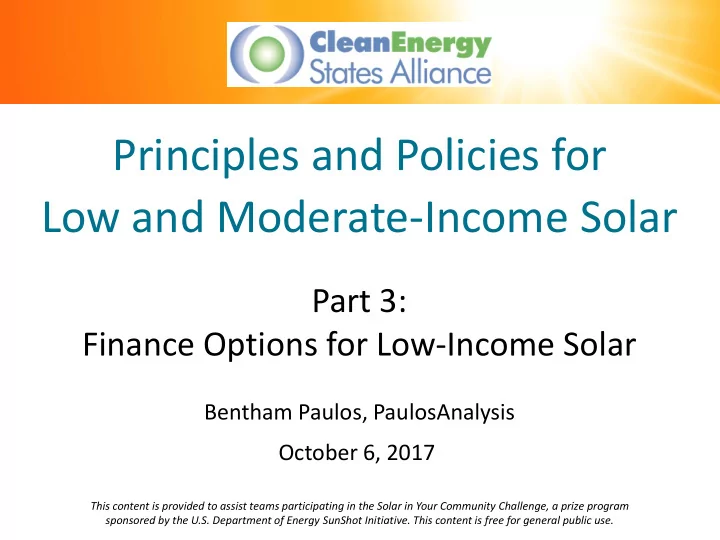

Principles and Policies for Low and Moderate-Income Solar Part 3: Finance Options for Low-Income Solar Bentham Paulos, PaulosAnalysis October 6, 2017 This content is provided to assist teams participating in the Solar in Your Community Challenge, a prize program sponsored by the U.S. Department of Energy SunShot Initiative. This content is free for general public use.
Learning Objectives • To understand the difficulties in financing LMI solar projects. • To be familiar with some solutions that have been implemented or proposed for financing low-income solar.
Who 80,000 • About 130m housing units, 75m are above 2x 70,000 200 percent or more the federal poverty 150 to 199 percent 60,000 100 to 149 percent level (FPL) 50 to 99 percent 50,000 • Slightly more rental Less than 50 percent units under 2x FPL than 40,000 homeowners 30,000 • Many more under the 20,000 FPL 10,000 0 Owner Renter
What and where • 30m homes under 150% of federal West Northeast 21% poverty level: by region, 17% ownership, urban/rural Midwest 21% Households Under 150% of FPL South 41% 35,000 29,790 30,000 Owner 25,000 44% Renter 20,000 56% 15,000 Outside MSA Central 23% city 10,000 36% 7,959 6,264 5,836 5,000 2,908 Not central 0 city Total Mfrd & mobile Black alone Hispanic Elderly (+65) 41% homes
Conundrums • Solar can save a low-income person money, but they don ’ t have savings to invest. A solution is to finance it, but low-income people are considered a credit risk, so most vendors shy away. • Many low- income people don’t own their homes or live in multi-family housing. But off-site policies and programs are rare. • Should policies seek leverage, or just give away solar systems? Leverage reaches more customers, but give away increases savings and reduces risk.
Big debate • Should low-income homeowners take on more debt to go solar? • Risk: default could be catastrophic if the debt is secured by the home (PACE, HELOC) • But unsecured debt (credit card) can be very expensive, especially for customers with poor credit • 3 rd party PPA vendors (no money down) avoid risky customers • Should loan eligibility be based an ability to repay, credit scores, or alternative measures? • Some states have policy to reduce risk and reduce cost of borrowing for low-income households
Solutions for low-income solar • Preserve the value: NEM, rate design • Lower the cost: rebates, bulk purchases, donations, cut soft costs • De-risk the finance: low-interest loans, guarantees for developers, on-bill finance • Community solar for renters: VNEM • Enabling policies for affordable housing: tax credits, finance, HUD policies
More information • Clean Energy States Alliance (CESA.org) • Bringing the Benefits of Solar to Low- Income Customers • Directory of State Clean Energy Policies and Programs for Low-Income Residents • Publicly Supported Solar Loan Programs • And more! • Database of State Incentives for Renewable Energy (DSIREusa.org) • Solar Market Pathways (http://solarmarketpathways.org/)
Contact Information Bentham Paulos Principal, PaulosAnalysis ben@paulosanalysis.com www.PaulosAnalysis.com
Thank you for attending our webinar Questions? Contact: Diana Chace Program Associate, CESA diana@cleanegroup.org Visit CESA’s Solar In Your Community Challenge webpage for more info and resources: www.cesa.org/projects/sustainable-solar/solar-in-your-community-challenge-webinar-series Find us online: www.cesa.org facebook.com/cleanenergystates @CESA_news on Twitter
About This Webinar Series This webinar series is divided into two four-part webinars. Principles and Policies for Low and Principles and Policies for Low and Moderate Income Solar, Part 1 Moderate-Income Solar, Part 2 Friday, October 6, 2017 Friday, November 17, 2017 1. Opportunities and Challenges 1. Presenting solar information to LMI 2. Case Studies consumers 3. Financing Options 2. Engaging LMI communities 4. Direct Incentives 3. Solar+storage for LMI communities 4. Community solar for LMI customers Webinar recordings and registration forms are available on CESA’s website at: www.cesa.org/projects/sustainable-solar/solar-in-your-community-challenge-webinar-series
Principles and Policies for Low and Moderate-Income Solar, Part 2 Friday, November 17, 12-2pm ET Topics to be covered: • Presenting solar information to LMI consumers • Engaging LMI communities • Solar+storage for LMI communities • Community solar for LMI customers Sign up at: http://bit.ly/CESA-Webinar-11-17 Virtual Office Hours The instructors will be available for one-on-one consultations with Challenge participants after the webinars, through virtual office hours . To schedule a consultation, contact Diana Chace at diana@cleanegroup.org
Recommend
More recommend